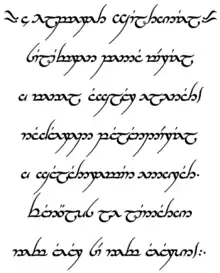A Elbereth Gilthoniel
A Elbereth Gilthoniel is an Elvish hymn to Varda (Elbereth) in J. R. R. Tolkien's The Lord of the Rings.
Text

There are three versions of this iambic tetrameter hymn, the first of which is the largest portion of Sindarin in The Lord of the Rings:
| A Elbereth Gilthoniel | O Elbereth Starkindler, |
| silivren penna míriel | white-glittering, slanting down sparkling like a jewel, |
| o menel aglar elenath! | the glory of the starry host! |
| Na-chaered palan-díriel | Having gazed far away |
| o galadhremmin ennorath, | from the tree-woven lands of Middle-earth, |
| Fanuilos, le linnathon | to thee, Everwhite, I will sing, |
| nef aear, sí nef aearon! | on this side of the Sea, here on this side of the Ocean![1] |
| A Elbereth Gilthoniel | O Elbereth Starkindler, |
| o menel palan-díriel, | from heaven gazing afar, |
| le nallon sí di'nguruthos! | to thee I cry now beneath the shadow of death! |
| A tiro nin, Fanuilos! | O look towards me, Everwhite![2] |
Musical settings
In 1967 Donald Swann published a musical rendition in the musical score of the song cycle The Road Goes Ever On. He and William Elvin also recorded this song cycle on an LP record. The LP also included a recording of Tolkien reading this prayer. The Road Goes Ever On was republished in 1978 and 1993, and the recording was released as a CD in 1993. The CD contained only the song cycle (including "A Elbereth Gilthoniël"), but not Tolkien's reading of the prayer.[3]
The BBC's 1981 radio dramatization of the Lord of the Rings included a version composed by Stephen Oliver which was released as the second track of soundtrack album, which itself is included in some commercial versions of the BBC's production.[4]
In 2006, The Tolkien Ensemble and Christopher Lee released a collection of previously released songs, Complete Songs & Poems, which included four different musical renditions of the poem, one of which marked as number III, is the complete poem sung by Signe Asmussen, a soprano.[5]
A rendition composed by David Long with Plan 9 (David Donaldson, Steve Roche, and Janet Roddick)[6][7] is briefly heard in the Extended Edition of The Lord of the Rings: The Fellowship of the Ring, where Sam and Frodo encounter "wood elves" who are singing the hymn while leaving Middle-earth. The complete song ("Passing of the Elves" / "Elvish Lament") is included in The Complete Recordings edition of the soundtrack for the film.
Australian composer Laura Bishop composed her own rendition of this elven hymn. Beginning with a solo by a soprano it then repeats with an SATB choir.[8]
The Norwegian classical composer Martin Romberg has set the lyrics to music in his work "Eldarinwë Liri" for girls' choir, which also includes the four other poems Tolkien wrote in Elven languages. The work premiered in 2010 with the Norwegian Girls Choir and Trio Mediæval at the Vestfold International Festival.[9]
The ending of the song "Zjawy i ludzie" ("Apparitions and Humans") by the Polish band Armia features the phrase "O Elbereth! O Gilthoniel!"[10]
Influences
In Tolkien's legendarium, Varda, also known as Elbereth, is one of the Valar and the highest of the "guardians". Peter Kreeft sees her as one of the clearest reflections of Roman Catholic Marian devotion in Tolkien's work.[11]
In A Elbereth Gilthoniel, scholars such as Marjorie Burns and Stratford Caldecott see an echo of John Lingard's Marian hymn, Hail Queen of Heaven, the Ocean Star.[12] Caldecott commented that "Tolkien would have been familiar with one of the most popular Catholic hymns from his childhood, the tone and mood of which are markedly close to those of Tolkien's song to Elbereth."[13]
References
- The Fellowship of the Ring, J.R.R. Tolkien, "Many Meetings"
- The Two Towers, J.R.R. Tolkien, "The Choices of Master Samwise"
- Scull, Christina; Hammond, Wayne G. (2006). The J. R. R. Tolkien Companion and Guide ('Chronology' volume). HarperCollins. pp. 710, 721. ISBN 978-0-618-39113-4.
- "Music from the BBC radio dramatisation of J.R.R. Tolkien's "The Lord of the rings" [sound recording] / [composed and conducted by] Stephen Oliver". National Library of Australia and partner organisations. Retrieved 3 September 2020.
Published London : BBC Records, 1981.
- "The Tolkien Ensemble". tolkien-ensemble.net. Retrieved 2013-06-15.
- "A Magpie's Nest - Passing of the Elves". Amagpiesnest.com. Retrieved 2011-09-15.
- "The Plan 9 Interview".
- "Composing: A Elbereth Gilthoniel: performed by the Sydney Conservatorium Chamber Choir". Laura Bishop. Retrieved 3 September 2020.
- "Announcement of the Vestfold International Program 2010". Sandefjords Blad.
- "Armia - Zjawy i ludzie" (in Polish). Retrieved 3 September 2020.
Taki pejzaż, urojenia Taki pejzaż, urojenia O Elbereth! O Gilthoniel!
- Peter Kreeft, The Philosophy of Tolkien: The Worldview Behind The Lord of the Rings (2005), p. 75, citing Letters (ed. 1981) no. 213, p. 288, San Francisco, Ignatius Press, 2005, ISBN 9781586170257
- Burns, Marjorie. "Saintly and Distant Mothers", Kerry, Paul E., The Ring and the Cross: Christianity and The Lord of the Rings, p. 251, Rowman & Littlefield, 2011 ISBN 9781611470642
- Caldecott, Stratford (2002). "The Lord & Lady of the Rings The Hidden Presence of Tolkien's Catholicism in The Lord of the Rings". Touchstone (Jan/Feb 2002).
.jpg.webp)